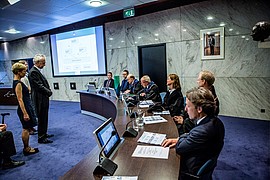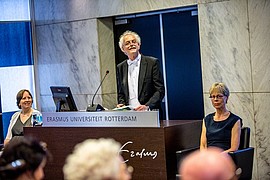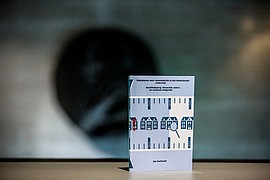PhD Defence: Jos Verkroost

In his dissertation ‘Indicators for risk detection in Dutch Education, Quality management, financial ratios and vertical integration’ ERIM’s Jos Verkroost examines the effectiveness of indicators which are used by the Education Inspectorate of the Ministry of Education to supervise school boards in the Netherlands.
Jos defended his dissertation in the Senate Hall at Erasmus University Rotterdam on Friday, 1 July 2016 at 13:30. His supervisor was Prof. G.W.J. Hendrikse. Other members of the Doctoral Committee were Prof.dr. S.P. Kaptein (RSM), Prof.dr. A. de Jong (RSM), and Prof.dr. I.F. de Wolf (Maastricht University).
About Jos Verkroost

Jos Verkroost was born on June 26 1955 in Someren. After gymnasium-B at the Episcopal College in Weert, he has received a master’s degree in Dutch Language and Literature at the Catholic University in Nijmegen.
From 1978 he has been a teacher in Dutch language in vocational education. From 1983 to 1996 he has been school manager in vocational education
In 1986 he has started a study Business Administration, later combined with Business Economics at the Open University. In 1994 he has received master’s degrees in both.
In 1996 he has become inspector, later coordinating inspector with the Dutch Inspectorate of Education. This has involved management tasks and involves since 2006 development of new inspection methods.
In 2013 he has started as PhD student in a program for inspection research at the Erasmus University Rotterdam under supervision of George Hendrikse.
Jos Verkroost is married and has two children.
Thesis Abstract

School boards in the Netherlands are private entities with public funding and a large autonomy. Supervision is done by the Education Inspectorate of the Ministry of Education and involves both the educational and the financial performance. This supervision is risk-oriented, based on risk indicators. In this thesis, the effectiveness of these indicators is examined.
The first involves the assessment of the quality management system of school boards. Boards must systematically ensure and improve the quality of education. By assessing these systems, the Inspectorate hopes to obtain information about their actual performance. The research question is to which extent this is possible. The assessment captures several elements of a total quality management system but others are missing. Only those that match with corresponding elements in reality, are correlated with each other. Just having a quality system is not related to the performance.
The second study researches the usefulness of financial ratio models in predicting financial (dis)functioning by boards. The question is whether the inspectorate would be able to predict these better. Four models are compared with each other under different conditions. The conclusion is that they do not lead to very different results. Combining different models in a decision model and the selection of a proper cut value can lead to predicting up to 90 percent of the financial problems in a subsequent year.
The third study evaluates to which extent the vertical integration of school boards has added value. The focus is on the recruitment position of schools, their educational outcomes and their financial performance. The conclusion is that vertical integration has no clear added value from an educational point of view. In financial terms, it is an obvious risk. Vertical boards often have financial difficulties and higher overhead.
· View and download Jos' dissertation
Photos: Chris Gorzeman / Capital Images


